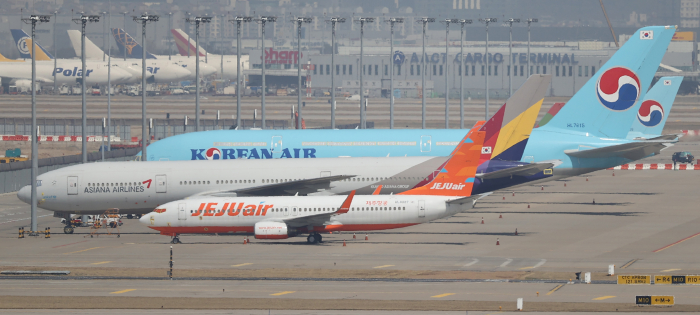
Aircraft stationed at Incheon International Airport The European Union's tougher emission standards are creating a new headache for airline companies, which are raising their international flights to pre-pandemic levels in line with eased quarantine restrictions.Starting in 2025, all aircraft to take off from the EU countries will be required to gradually switch to sustainable aviation fuel (SAF). Under the guidelines, flights from the EU need to have non-fossil fuel account for 2% of their aviation fuel by 2025 and then 63% by 2050, according to industry insiders on April 10. The requirements are in compliance with the decision by the International Air Transport Association (IATA). The representative body for the airline industry has decided to replace a portion of aviation fuel with non-fossil fuel, or SAF, to cut carbon emissions by 65% by 2050.SAF refers to jet fuels produced from waste oils of biological origin and agricultural residues such as animal and plant fats, used cooking oil and sugar cane. Those substitutes for fossil fuels are expected to help airlines cut carbon emissions by up to 80%.However, the key hurdle to adopting low-carbon fuels will be the high price of SAF, which is three to five times more expensive than conventional aviation fuel. To meet the 2% target for SAF, South Korean airlines will likely face an additional cost of a combined $377,152 per year, according to the industry insiders. Considering that Europe is a popular destination, stricter emission standards should further increase the fuel costs for South Korean airlines going forward. In the absence of domestic SAF suppliers, Korean Air Lines Co. signed a SAF supply contract with a French oil company in February of this year to add SAF to jet fuel for its flights departing from Paris.Last year the flag carrier inked a memorandum of understanding with Hyundai Oilbank Co., a leading Korean refiner, to cooperate in producing bio-jet fuels. But it will likely take quite a long time for their tentative agreement to yield tangible results.Airlines were nicknamed climate villains in the sky because they emit more carbon dioxide than automobiles, buses and trains.The average carbon footprint for passengers is 105 grams per 1 kilometer for buses; 171 g for diesel-fueled cars; and 255 g for short-haul aircraft, according to the UK Department for Business, Energy and Industrial Strategy.By Jeong-Min Nampeux@hankyung.comYeonhee Kim edited this article
Most Read